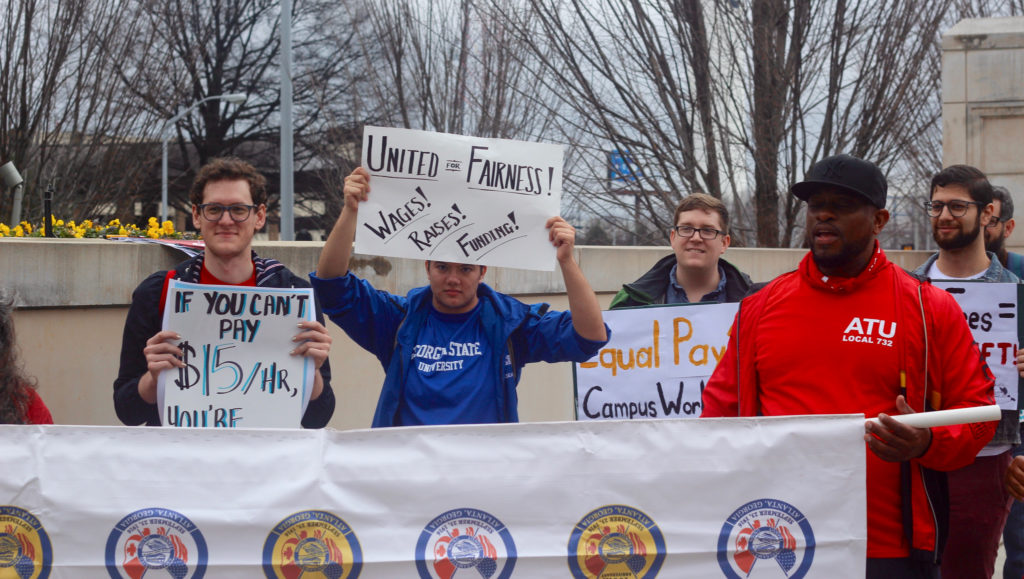
Last Wednesday, Feb. 5, members of United Campus Workers of Georgia (UCWGA) met at the state capital to rally for improved pay and conditions for workers of the University System of Georgia (USG).
They had three main demands they advocated for. First, HB 116, a bill enacting a $15 per hour minimum wage for all employees of USG. Second, SR 291, a resolution proposing wage raises for salaried employees consistent with inflation and increased cost-of-living in the areas in which they work.
Lastly, the proposal of future legislation mandating fee waivers for graduate-level employees in order to avoid the current “pay-to-work” system.
The existing proposed 2021 budget includes a $1,000 raise for USG employees making less than $40,000 annually, however, in many communities this represents a raise less than the increase in cost-of-living in the same time period.
“Between 2001 and 2019, the cost of living rose by an average of 2.1% a year while faculty salaries at KSU went up by an average of only 1% each year,” the press release noted.
Most minimum-wage workers for USG represent disadvantaged communities. These positions are composed of 64% women and 51% people of color, all making significantly less than $15 per hour, or $31,200 annually.
Furthermore, graduate-level students currently pay full-price fees for the institutions they attend, although they also receive a salary. This “pay-to-work” system results in greatly reduced salaries for these students after the payment of fees.
Tiffany Nguyen, a PhD student at Tech in the school of psychology and founding member of the Tech chapter of UCWGA, emphasized the financial stress of paying fees out of the limited salary received by Ph.D. students.
“Many grads aren’t guaranteed an assistantship over the summer, so while some people already have part-time jobs during the school year, many more people are forced to work at Starbucks or CVS Pharmacy to be able to pay rent over summer and in preparation for fees during the year. Actually, that was the advice we got from our first-year mentor,” explained Nguyen.
Full-time faculty at other USG institutions also came to the rally to express their concerns. Dr. Jill Penn, an Assistant Professor of Biology and Biochemistry at Georgia Gwinnett College, attended the rally and explained her perspective of the event.
“The rally was a huge succes.Congress members came outside to watch, kids visiting for the day from the schools took interest and press was taking photos and conducting interviews.”
Penn noted how she has personally been affected by the issues at hand as a USG employee herself.
She commented that wage stagnation leads to salary compression of senior employees. New hires will often make higher wages than current employees with more experience.
In addition, USG employs a merit-based raise system instead of giving raises on a cost-of-living basis.
“Merit raises are distributed unfairly and it’s impossible to not have biases from evaluators. I’ve seen people who deserve merit raises not get them and it makes for a difficult work environment,” Penn describes.
Another recent action by Governor Kemp that UCWGA opposes is the enforcement of the “Critical Hire Process” for employees of USG. The mandate went into effect on Dec. 19, 2019. It requires that new employees hired into USG are “critical” to the university. As a result, there is more documentation necessary for hiring university employees with salaries above $40,000 annually.
Many members of UCWGA view this move by Governor Kemp as an effort to complicate the hiring process, with the hope of tightening USG budgets. Kate Diedrick, a researcher for UCWGA, explains their stance on this mandate.
“Public higher education institutions are not for-profit businesses pressured by shareholders and the profit motive. There is no need for this policy. These institutions belong to students, to workers and the public and these stakeholders should be the ones to define what jobs are critical to success.”
The congressional response to UCWGA’s demands has been mixed so far. Chuck Martin, the chair of the State Higher Educational Committee, felt that money was needed more urgently in other areas outside of higher education.
Many members of UCWGA feel that the budget tightening for USG may be due to Governor Kemp’s recent tax cuts, much of which are beneficial to those making in excess of $100,000 annually.
Dr. Penn explains that there are many ways for undergraduate students to take action. “Students can call and write their congress members, share stories on social media and raise their voices. There are people in congress who do want to help and they can do it if the people demand it.”
